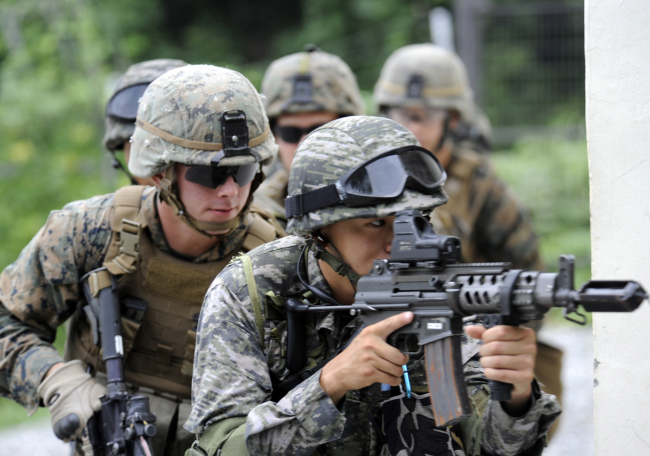South Korea agrees to pay 5.8% more to host U.S. troops
Allies agree to improve transparency in use of Seoul’s contributions
By Korea HeraldPublished : Jan. 12, 2014 - 20:10

South Korea on Saturday agreed to pay 920 billion won ($867 million) this year for the upkeep of 28,500 U.S. troops here, an increase of 5.8 percent from last year’s contributions, Seoul’s Foreign Ministry said Sunday.
After grueling six-month negotiations, the allies struck a deal to renew the Special Measures Agreement governing Seoul’s burden-sharing cost, which will remain valid for five years.
In return for the increase, Washington agreed to enhance bilateral coordination and transparency in the use of Seoul’s payment through a set of measures including offering Seoul detailed reports on how the funds are allocated and spent.
“For the first time since Seoul began shouldering the cost (in 1991), we achieved comprehensive institutional improvements (for the transparent use of the funds),” the Foreign Ministry said in a press release.
“After all, around 90 percent of the funds will return to our economy given that Seoul’s payment is used (for the U.S. military) to employ Korean civilian workers and to carry out logistical and construction projects led by Korean firms.”

The allies’ agreement requires parliamentary approval. Following an internal process of legal deliberations and presidential endorsement, the government is expected to request approval from the National Assembly next month.
A senior ministry official said that throughout the 10 rounds of high-level negotiations, Seoul’s primary focus was on maintaining robust deterrence against North Korea, strengthening the alliance and crafting measures to ensure more transparency in the use of the funds.
The allies’ negotiations over the SMA were tougher than previous ones as Washington pushed for a hefty rise in Seoul’s monetary support due to its financial woes and heightened military tensions on the peninsula.
Under the renewed deal, the two countries are to apply the consumer price index, set two years ago, to determine the level of annual increase in Seoul’s contributions. The increase rate should not exceed 4 percent.
Announcing the deal, Seoul underscored a comprehensive set of fresh measures to ease its concerns over the SMA funds remaining unspent within the designated year or used for unspecified purposes.
The U.S. agreed to provide Seoul with a detailed report on unspent defense funds twice a year. It also agreed to brief the National Assembly on these funds without violating military security rules.
The allies’ agreement also includes setting up a consultation mechanism to coordinate over mid- or long-term military construction projects, improving the “welfare and well-being” of South Koreans working for the U.S. Forces Korea, and ensuring transparency in the use of the funds for their wages.
Since 1991, Seoul has shouldered partial costs under the SMA for Korean civilians hired by the U.S. Forces Korea; the construction of military facilities to maintain the allies’ readiness; combined defense improvement projects; and other logistical support.
Seoul has offered cash for Korean workers’ wages while providing both cash and noncash support for the construction of U.S. military facilities here. For logistical support, it has made payments in kind.
Seoul’s burden-sharing, which was 812.5 billion won in 2011 and 836.1 billion won in 2012, amounted to 869.5 billion won last year.
The allies’ deal to increase Seoul’s burden-sharing came as the U.S. has pushed to strengthen its military presence on the peninsula as part of its rebalancing policy toward the strategically crucial Asia-Pacific region.
The U.S. military plans to deploy 12 F-16 fighters to Korea this month along with 300 troops. It will also send an 800-strong mechanized infantry battalion here on a rotational basis.
The U.S. also brought back the 23rd Chemical Battalion last April, and the 4th Squadron, 6th Cavalry Regiment last October, as North Korea continues to pose security threats to the South and the greater region.
By Song Sang-ho (sshluck@heraldcorp.com)
-
Articles by Korea Herald


![[AtoZ into Korean mind] Humor in Korea: Navigating the line between what's funny and not](http://res.heraldm.com/phpwas/restmb_idxmake.php?idx=644&simg=/content/image/2024/04/22/20240422050642_0.jpg&u=)


![[Herald Interview] Why Toss invited hackers to penetrate its system](http://res.heraldm.com/phpwas/restmb_idxmake.php?idx=644&simg=/content/image/2024/04/22/20240422050569_0.jpg&u=20240422150649)
![[Exclusive] Korean military set to ban iPhones over 'security' concerns](http://res.heraldm.com/phpwas/restmb_idxmake.php?idx=644&simg=/content/image/2024/04/23/20240423050599_0.jpg&u=20240423183955)
![[Graphic News] 77% of young Koreans still financially dependent](http://res.heraldm.com/phpwas/restmb_idxmake.php?idx=644&simg=/content/image/2024/04/22/20240422050762_0.gif&u=)







![[Exclusive] Korean military to ban iPhones over security issues](http://res.heraldm.com/phpwas/restmb_idxmake.php?idx=652&simg=/content/image/2024/04/23/20240423050599_0.jpg&u=20240423183955)



![[Today’s K-pop] Ateez confirms US tour details](http://res.heraldm.com/phpwas/restmb_idxmake.php?idx=642&simg=/content/image/2024/04/23/20240423050700_0.jpg&u=)